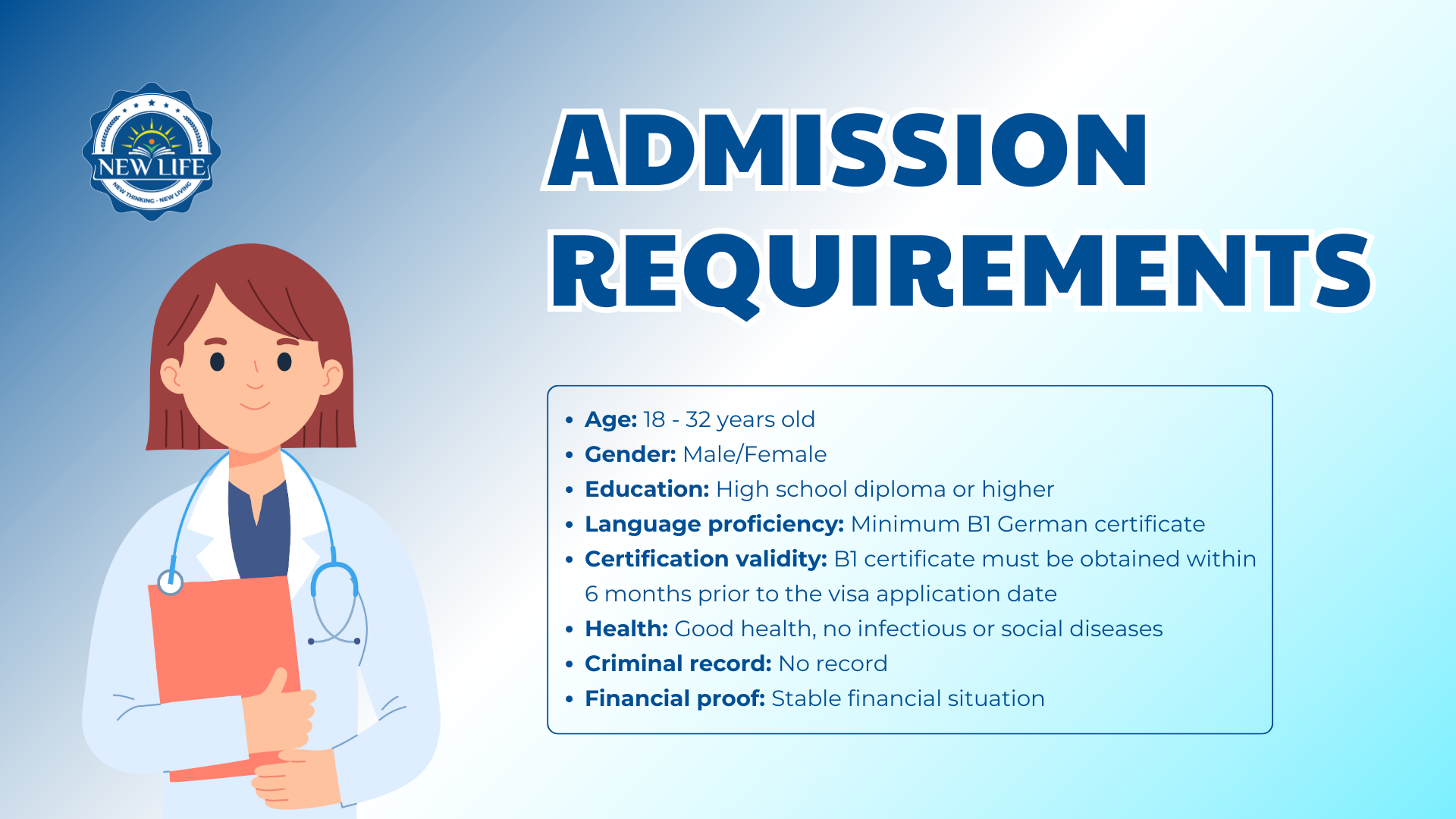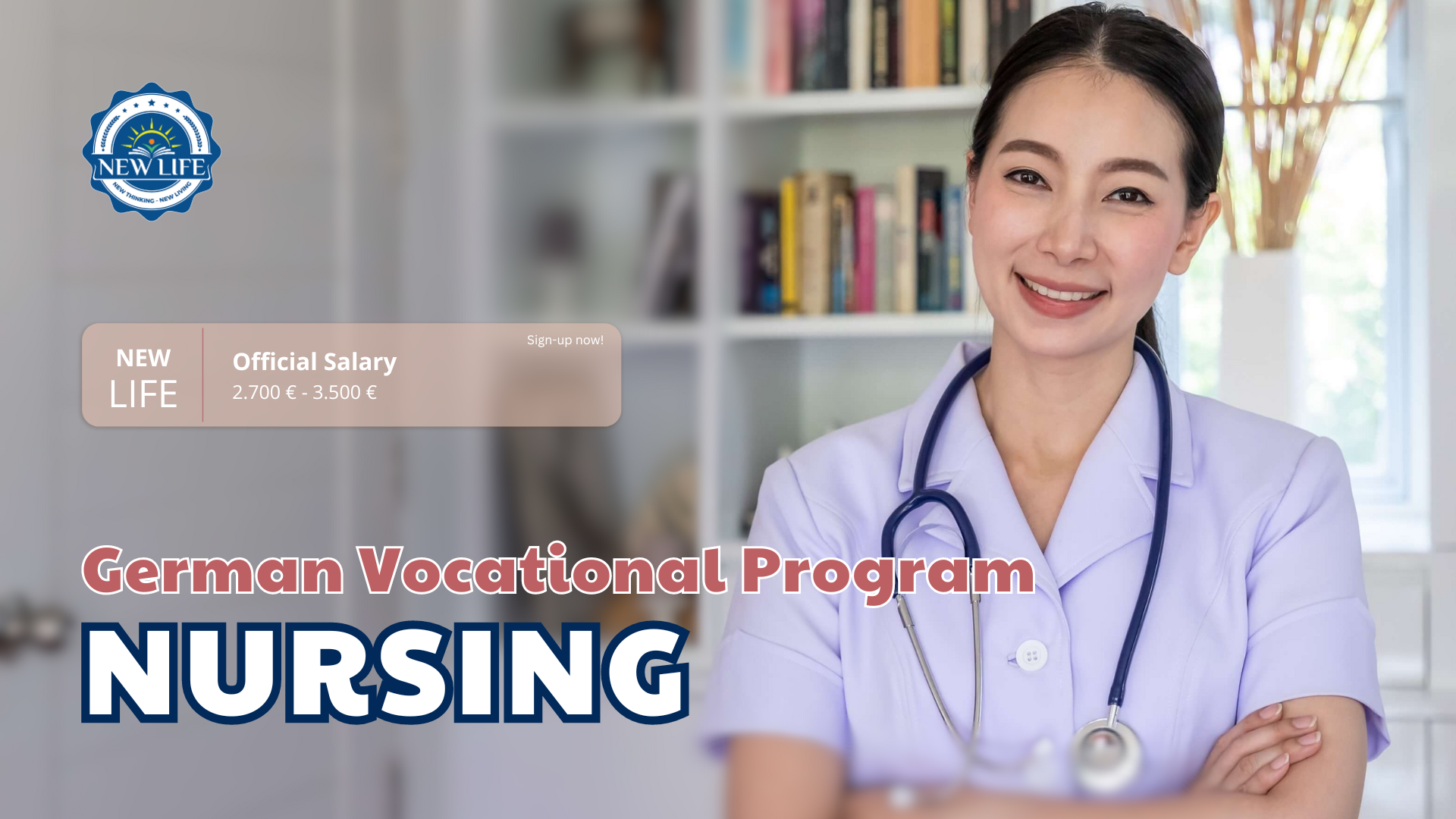Study Abroad
ROUTES TO STUDY NURSING IN GERMANY 2024
- 18/06/2024
- Posted by: New Life
- Category: Vocational Training in Germany

Nursing is a profession with a high demand for recruitment in Germany, but there is insufficient domestic workforce to meet the market needs. Therefore, since March 2020, Germany has introduced new policies to welcome hundreds of thousands of workers from other countries to live and work there, especially in the nursing sector. Studying vocational nursing in Germany has thus attracted a lot of attention from young people recently, thanks to its lenient admission requirements, high benefits, and long-term advantages. Let’s explore the appeal of the nursing profession in Germany with New Life!
What is vocational nursing study in Germany?
Vocational study refers to the form of education and job-seeking in a foreign country outside of Vietnam, typically in countries with specific education and labor policies for international students. Vocational study in countries like the USA, Australia, Japan, and South Korea was extremely popular in the past decade. However, the labor saturation and various social issues have led to stricter immigration policies in these nations. As a result, vocational study in Germany has emerged as a new opportunity for young people and parents to consider in recent years.
The primary reason for the trend toward vocational nursing study in Germany is the rapid aging population in Europe in general and Germany in particular. It is predicted that by 2040, the workforce in Germany will account for less than 50% of the total population, leading to a severe labor shortage. This is the root cause of the German government’s push to seek nursing professionals to care for the physical and mental health of nearly one-quarter of the nation’s population.
Nurses are individuals who have undergone specialized training in the vocational nursing program in Germany, becoming key personnel alongside doctors. They assist patients of all ages in recovering as best as possible, mainly focusing on elderly people who are no longer able to work. Nurses work in hospitals, nursing homes, and private clinics across Germany and can change their workplace depending on personal preferences.

Reasons to study Nursing in Germany?
There are numerous benefits to pursuing vocational nursing studies in Germany, ranging from the labor market demands to the high-quality benefits provided. Investing in a complete vocational study plan now is a great way to secure your future. So, what makes the nursing industry in Germany so appealing?
Diverse market demand
According to the latest report from Deutsche Welle, by 2030, Germany will need more than 300,000 nurses. This is a huge target compared to the average of only about 60,000 nurses each year.
Each year, Germany needs around 400,000 immigrants but is short by 110,000 workers. Of those, only about 60,000 are skilled laborers, which is not enough to balance the aging population.
Germany’s healthcare spending accounts for 11% of its GDP, compared to about 8.4% in other countries. This demonstrates that social security and public health are essential to ensuring the country’s continuous development. Thus, vocational nursing in Germany is among the top high-salary study choices with long-term career prospects.
World-class education system
Germany consistently ranks in the top five countries with the best education systems globally (alongside Finland, Norway, Switzerland, and Denmark). With prestigious universities such as Munich, RWTH Aachen, and Freiburg, studying in Germany provides a solid foundation for practicing your profession anywhere in the world.
100% Tuition-free for regular programs
Despite having many prestigious schools, international students in Germany are not only exempt from tuition fees throughout their studies but also receive internship stipends if they join vocational programs. This policy is aimed at attracting talent from all over the world to maintain Germany’s thriving economy.
High salaries
Healthcare and nursing are among the highest-paying fields in Germany. Nursing jobs offer a high income, second only to doctors, with monthly salaries reaching up to €4,000, excluding tips. Skilled and dedicated nurses are often favored by clients and can be promoted to higher positions with attractive income levels.
Moreover, during the training process, you can earn an internship salary ranging from €1,050 to €1,200 per month, enough to cover living expenses and personal needs.
Internationally recognized qualification
A nursing degree from Germany opens up opportunities to work anywhere in the world, as German qualifications are highly valued internationally. This is affirmed by the country’s top-quality education system, which has produced hundreds of thousands of highly skilled professionals.
Excellent social welfare system
In addition to its renowned high-quality education, Germany is known for its highly developed social welfare system. Once you start working and paying income taxes in Germany, you are officially entitled to five types of insurance:
- Health insurance
- Care insurance
- Pension insurance
- Accident insurance
- Unemployment insurance
Permanent residency opportunities
According to German law, after five years of legal residence, international students can apply to switch from a temporary residence permit to permanent residency.
A temporary residence permit, also known as the EU Blue Card, is issued to nurses with a university degree or higher, who have worked for at least 24 months (two years) under a formal employment contract and earn a pre-tax salary of at least €43,992 per year.
After working in the nursing field for more than 33 months and meeting the following conditions, applicants with an EU Blue Card can apply for permanent residency in Germany:
- Have held a residency permit (EU Blue Card) for five years.
- Have sufficient income to support themselves or their family.
- Have not received social or unemployment benefits from the government.
- Have contributed to pension insurance for 60 months.
- Have no criminal record in Germany and are not on probation.
- Have German language proficiency at level B1 or higher.
- Have housing that meets legal requirements (at least 12m² per person).
Long-term career prospects
The healthcare field always offers long-term career prospects, regardless of the country. Vocational nursing study in Germany allows you to work in all states of the country, whether in hospitals, rehabilitation centers, nursing homes, or home care services.
Nursing is among the high-paying fields with attractive benefits, a clear career advancement path, and considerable respect in Germany. After gaining sufficient experience, you can pursue further studies to take on more important roles such as human resources management, nursing supervision, or department head.
Salary base and benefits for Nursing students in Germany
The vocational nursing program in Germany allows students to receive paid internships throughout their training, specifically as follows:
After graduation, you will officially become a certified nurse in Germany with a formal qualification. The official monthly salary ranges from €2,700 to €3,500, excluding commissions from patients if you have strong skills and provide dedicated, professional care.

Differences between Nurses and Caregivers
Many people still confuse the roles of nurses and caregivers. Regardless of the country, these are two distinct professions with different functions and responsibilities.
- Nurses are assistants to doctors and undergo short-term basic training (9-18 months) to practice. Their role involves supporting patients’ physical and psychological care before caregivers or doctors step in.
- Caregivers are specialists with advanced medical training, typically undergoing long-term education from intermediate to higher levels (2-4 years). They closely coordinate with other departments and precisely follow doctors’ orders. Caregivers must be equipped with comprehensive knowledge and skills, including medical science, social and psychological care, communication, and operation of modern medical technology, ensuring the highest level of patient care.
Requirements for Nursing Vocational Program in Germany
To join a vocational nursing program in Germany, you need to meet the following admission criteria:

Training routes for Nursing Vocational Study in Germany
The vocational training program for nursing in Germany lasts for 3 years, with a 50% split between theoretical studies and practical training at hospitals. Here’s a detailed breakdown:
Year 1 & 2: During the first and second years, students will learn theoretical aspects of nursing diagnosis, process control and evaluation, patient communication and counseling, logical thinking, and practical application based on foundational knowledge and professional ethics. Practical training at workplaces will help orient students towards their chosen specialization for the final year. This includes areas such as acute and long-term care for inpatients and outpatients, pediatric and maternal care. At the end of the second year, students will take a final exam.
Year 3: In the third year, students are required to undergo practical training in general psychiatric care, geriatrics, pediatric care, or adolescent care. Students will then choose one of five specializations to focus on: acute inpatient care, long-term inpatient care, acute or long-term outpatient care, pediatric care, or general psychiatric care. Alongside this, they will also engage in other tasks such as nursing counseling, rehabilitation, and palliative care. The program concludes with a final exam.
Costs for Vocational Study in Germany
The costs from starting German language courses to arriving in Germany and studying over four years include:
- German Language Tuition (A1 to B1): Approximately 50-60 million VND depending on the center (if no re-enrollment is needed).
- B1 Certification Exam Fee: About 3.5 million VND for all four skills (assuming no retake of any skills).
- Visa Application, Airfare, and Document Certification Fees: Around 150-250 million VND depending on the center.
- Additional German Language Courses: Depending on the specific field’s language requirements, extra tuition may be needed in Germany. Financial proof for living expenses averages around 900€ per month (approximately 25 million VND).
- Accommodation, Deposits, and Living Expenses: Initially budget around 2000€ – 2500€ for the first month in Germany (about 50-70 million VND). Subsequent monthly costs range from 600€ – 1000€ (approximately 17-27 million VND depending on the area).
- Tuition for 3 Years in Germany: 100% Free
Additional incidental costs may arise during living, studying, and working in Germany.
Alternatively, you can register for the “Fulfill Your Dream of Vocational Study in Germany” Pathway at New Life to avoid worrying about paperwork and focus entirely on obtaining your B1 certificate to soon “fly to Europe.”
Preparing for Nursing Vocational Study in Germany
It is advisable for parents to start guiding their children about 2 years before going abroad. This timeframe allows families and students to prepare thoroughly in terms of documentation, finances, skills, and aspects related to language and mental preparation. Without a plan, these can be significant challenges. Generally, the process of preparing for vocational study in Germany follows this sequence.

Step 1: Orientation and Application Review
You can choose to do this online or offline. New Life will provide detailed advice on tuition fees, accommodation, and admission requirements. Additionally, we will conduct a test to assess your suitability for the nursing program, helping to clearly define your study abroad path.
Step 2: Learn German and Life Skills (6-8 months)
Experienced instructors at New Life will guide you through learning German from A1 to B1, and then B2. You will also receive training in life skills, health, mental strength, and more. These additional courses are a standout feature of our center, emphasizing our commitment to quality education.
Step 3: Certification Exams (2-4 weeks)
This stage is crucial for your eligibility to study vocational nursing in Germany. New Life will support you in obtaining the B1 certificate required by German vocational schools. Exams are held at Goethe Institute, TELC, or ECL. For Goethe exams, you will receive results in about 2 weeks and the official certificate after 4 weeks. The exam fee is 4,300,000 VND for all four skills, covered by New Life.
Step 4: Interviews and Visa Application (4-6 weeks)
Students will have online interviews with German vocational schools. New Life will ensure your application is complete for a long-term student visa for Germany.
Step 5: Study and Work in Germany (3 years)
Students will study and work in Germany, receiving a monthly internship stipend of up to 1,200 Euros. New Life will assist with arranging your studies, accommodation, and internship to ensure a smooth experience.
Step 6: Obtain EU Blue Card (2 years)
After graduation and obtaining a nursing certificate, you will sign a work contract with a legal hospital in Germany. You can apply for a long-term residence permit, or EU Blue Card, after 21-33 months of work.
Step 7: German Citizenship
After living in Germany for 5 years, you can apply for German citizenship, allowing you to retain your original nationality and sponsor family members after 2 years of graduation.
Don’t hesitate to explore nursing vocational study in Germany today. New Life will support you in achieving your dream of studying and working in Germany with a complete application process, including:
- ID Card or Passport
- Birth Certificate
- Criminal Record Check
- Academic Transcripts
- Personal Introduction Letter
- Graduation Certificates (high school, vocational, college, university)
- B1 German Certificate
- Proof of German Language Course
- Training and Internship Contracts
- Approval Documents
- Financial Proof
- Health Insurance
- Other necessary documents
New Life is an educational company specializing in vocational study services in Germany. Our mission is to support students in achieving a better future through comprehensive study abroad programs. Choose from our BASIC, ADVANCED, or FULL PACKAGE options to suit your financial ability. Contact us for more details on our vocational training programs in Germany and start your European dream today!

NEW LIFE – GERMAN VOCATIONAL STUDY ABROAD
Website: https://newlife-jsc.com/
Hotline: 028 6286 3699
Email: info@newlife-jsc.com

